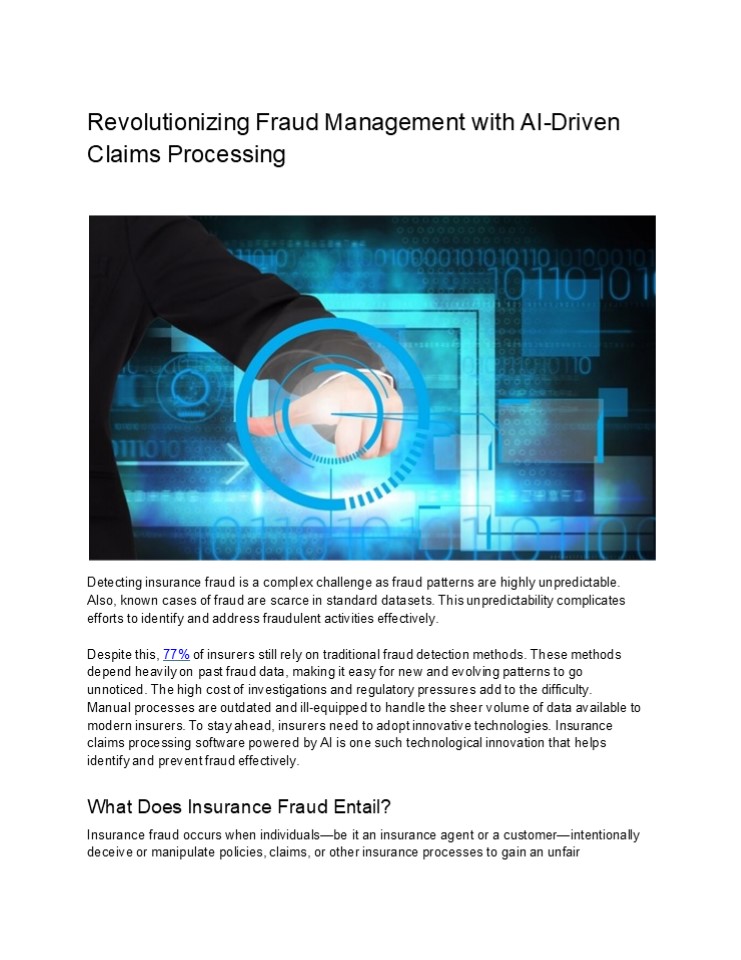Revolutionizing Fraud Management with AI-Driven Claims Processing - PowerPoint PPT Presentation
Title:
Revolutionizing Fraud Management with AI-Driven Claims Processing
Description:
Discover how AI-driven claims processing software enhances fraud management by detecting, preventing, and mitigating risks with advanced automation and analytics. – PowerPoint PPT presentation
Number of Views:3
Date added: 13 February 2025
Slides: 5
Provided by:
faheemshakeel
Category:
Products & Services
Tags:
Title: Revolutionizing Fraud Management with AI-Driven Claims Processing
1
Revolutionizing Fraud Management with AI-Driven
Claims Processing
Detecting insurance fraud is a complex challenge
as fraud patterns are highly unpredictable. Also,
known cases of fraud are scarce in standard
datasets. This unpredictability complicates
efforts to identify and address fraudulent
activities effectively. Despite this, 77 of
insurers still rely on traditional fraud
detection methods. These methods depend heavily
on past fraud data, making it easy for new and
evolving patterns to go unnoticed. The high cost
of investigations and regulatory pressures add to
the difficulty. Manual processes are outdated and
ill-equipped to handle the sheer volume of data
available to modern insurers. To stay ahead,
insurers need to adopt innovative technologies.
Insurance claims processing software powered by
AI is one such technological innovation that
helps identify and prevent fraud
effectively. What Does Insurance Fraud
Entail? Insurance fraud occurs when
individualsbe it an insurance agent or a
customerintentionally deceive or manipulate
policies, claims, or other insurance processes to
gain an unfair
2
- advantage. This type of foul play happens during
the purchase or management of insurance policies.
It takes a toll on policyholders and insurance
companies, draining financial resources and
eroding trust. The insurance fraud realm is
packed with various underhanded activities,
including bogus claims, outright theft, and
rigged claims filing. - Fake Claims
- Some individuals try to outsmart insurance
companies by pretending to hold policies they
never purchased. This is especially common in
health insurance, where scammers exploit the rise
of fake policies sold online. - Insurance Fraud
- This category includes under-the-radar tricks
that endanger insurance companies and drain their
profits. These might involve employees scheming
against the company, fraudulent claims, or fishy
partnerships with third parties. - Cybercrime
- Cybercrime is a vast, murky domain that covers
hacking, phishing scams, and deployment of
malicious software. Cyber crooks may steal
sensitive personal data or disrupt digital
systems, leaving chaos in their wake. - In insurance, fraud is like a persistent ghost
it is always lurking, always evolving. - Why Use AI-Powered Claims Management Systems for
Insurance Fraud Detection? - Artificial intelligence is reshaping the game in
insurance fraud detection. With cutting-edge
algorithms and machine learning wizardry,
AI-powered insurance claims processing software
excels at handling massive datasets, including
policyholder records, claims data, and historical
trends. By deploying AI bots, insurers can
supercharge tasks like data collection,
extraction, and analysis, ensuring faster,
sharper detection of fishy activities. Lets dive
into how AI-based claims management system gives
insurers a serious edge.
3
- information. This includes everything from
policyholder profiles to past claim trends,
offering deep insights at lightning speed. - 24/7 Fraud Detection
- Forget manual oversightAI runs a tireless watch
over transactions, claims, and policy data in
real-time. Advanced insurance claims processing
software spots red flags like bizarre claim
patterns, out-of-character customer behavior, or
mismatched policy details. Instant alerts enable
insurers to tackle suspicious activities without
delay. - Predictive Analytics
- Predictive analytics capabilities of claims
management systems for insurance companies let
them move from reactive to proactive fraud
detection. Sophisticated algorithms dig deep into
fraudster tactics, decoding their moves before
they happen. This technology pinpoints what
triggers fraud and helps insurers stop it before
it snowballs. - Improved Cost-Savings
- AI isn't just a tech flexits a cost-saver. By
reducing false alarms and flagging fraud with
precision, insurers cut down financial losses.
Automating repetitive tasks, like claim
assessments, means companies can scale operations
without adding a small army of employees. Its a
win-win for efficiency and the bottom line. - Examples of AI in Insurance Claim Fraud Detection
- Detecting and stopping claim fraud quickly is a
top priority for insurers. Preventing fake claims
helps lower premiums for clients and boosts
company profits. AI has transformed how insurers
manage claims by making information systems
smarter and easier to use. - Every year, insurers handle millions of claims.
Machine learning and AI algorithms analyze these
claims to identify patterns. They flag unusual or
suspicious requests in real-time, ensuring faster
fraud detection. - AI also evaluates a policyholders fraud risk by
studying their behavior patterns. It provides - real-time insights, giving insurers an early
warning about potential fraud during each
interaction. When analyzing claims, AI accurately
determines whether a request seems suspicious. It
provides a reason code to explain why further
investigation might be needed. This helps
insurers focus their resources on claims that are
most likely fraudulent, saving time and effort. - Conclusion
- Safeguard the future of your insurance business
with insurance claims processing software. These
systems use advanced algorithms and data
analytics to uncover and prevent fraudulent
activities, ensuring your company's and
policyholders' safety. With a robust system
designed to
4
spot anomalies, suspicious claims, and unusual
patterns, you can minimize losses and protect
your bottom line.































